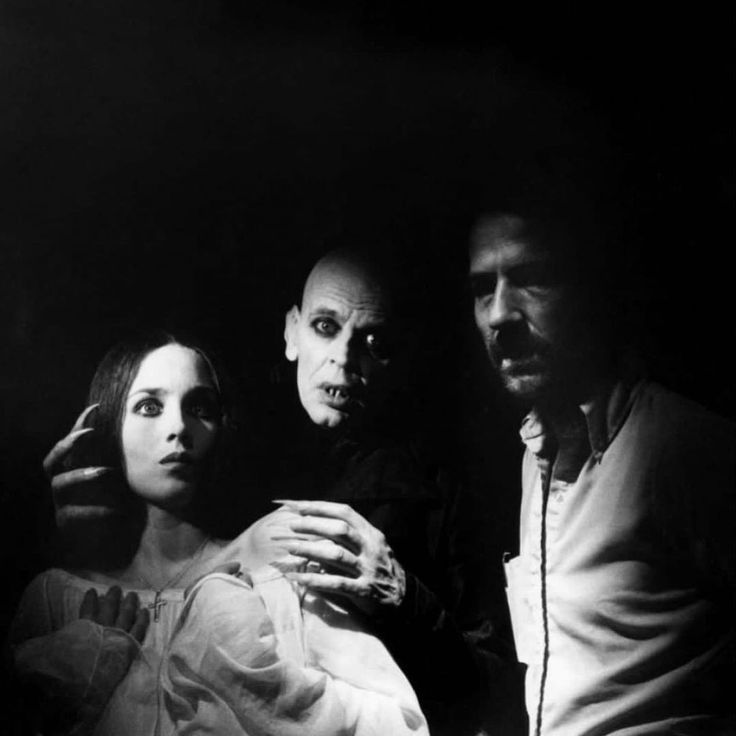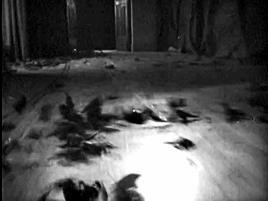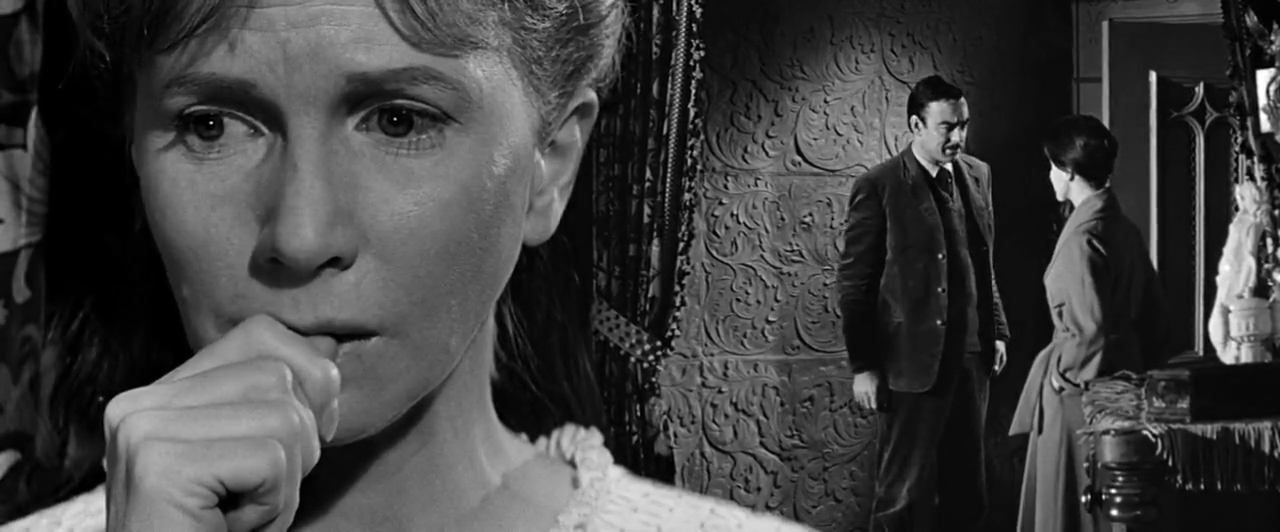Śledztwo [The Investigation] (Marek Piestrak, 1974)
Oct
28

A person offscreen shoots a handgun. DP: Edward Kłosiński.
bookadaptation
– You surely know that my financial support is unlimited. – Yes. Long live your false cheque factories!Tajemství hradu v Karpatech [The Mysterious Castle in the Carpathians] (Oldřich Lipský, 1981)
Oct
27
1897

A calendar – undeniably designed by the great Jan Švankmajer – with the date October 27, 1897, set on the day of – or referencing a saint – Sabina. Screenshot via DVDBeaver. DP: Viktor Růžička.
The Friends of Eddie Coyle (Peter Yates, 1973)
Oct
26
1972

Eddie Coyle (Robert Mitchum) and Dillon (Peter Boyle) at the Boston Bruins game. DP: Victor J. Kemper.
A key scene takes place at an NHL game between the Chicago Blackhawks and the Boston Bruins at the Boston Garden. Bobby Orr and Eddie Johnston are seen playing for the Bruins, and Keith Magnuson, Tony Esposito, Bill White, Pat Stapleton, and Cliff Koroll are seen playing for the Blackhawks. The real game took place on October 26, 1972, and Chicago won 6-3 (via).
“Stay off the tracks. Forget it. Its a bum's world for a bum.”Emperor of the North Pole (Robert Aldrich, 1973)
Oct
25

Lobbycard. The blurb reads: “The battle for the title of “Emperor of the North Pole” begins between Shack (ERNEST BORGNINE) and A-No. 1 (LEE MARVIN)“. DP: Joseph F. Biroc.
– Shack
La donna del lago [The Lady of the Lake / The Possessed] (Luigi Bazzoni + Franco Rossellini, 1965)
Oct
25

Tilde (Virna Lisi) caressing a man's hand, resting on her shoulder, with her cheek. DP: Leonida Barboni.
Until November 20.
”'M. Valdemar,' I said, 'are you asleep?' He made no answer, but I perceived a tremor about the lips, and was thus induced to repeat the question, again and again. At its third repetition, his whole frame was agitated by a very slight shivering; the eye-lids unclosed themselves so far as to display a white line of the{n} ball; the lips moved sluggishly, and from between them, in a barely audible whisper, issued the words: 'Yes; — asleep now. Do not wake me! — let me die so!'” Il caso Valdemar [The Facts in the Case of M. Valdemar] (Gianni Hoepli + Ubaldo Magnaghi, 1936)
Oct
24

M. Valdemar on his deathbed.
[A] favourite horror movie overall*
– Edgar Allan Poe, The Facts in the Case of M. Valdemar (1845) (via)
A man agrees on being hypnotised while in the state of dying. This particularly haunting and efficiently gory film – the first in the genre – is the result.
* the Bales 2025 Film Challenge for October is horror-themed as opposed to date-based, and is all about favourites. Expect non-horror and films I believe to be relevant instead.
“I never thought I could be friends with a German again. But here I am… Werner is somehow like Murnau brought back to life.” Nosferatu: Phantom der Nacht [Nosferatu the Vampyre] (Werner Herzog, 1979)
Oct
22
eternal returns

Adjani, Kinski, and Herzog on set. DP: Jörg Schmidt-Reitwein.
[A favourite] horror remake*
– Lotte Eisner visiting the set of Herzog's Nosferatu (via)
Coming back to Murnau's expressionist masterpiece was Herzog's bridge between the films made by the grandfathers of German cinema and his era. Herzog, born in 1942 Munich, noted this void created by that philistine regime and felt that, by picking up the thread cut a quarter of a century earlier, German culture could see a restoration to its (non-nationalistic) greatness. Thus a menagerie of rats and actors was released in a reluctant, bourgeois Dutch town.
But that's a story for another generation to draw upon.
* the Bales 2025 Film Challenge for October is horror-themed as opposed to date-based, and is all about favourites. Expect non-horror and films I believe to be relevant instead.
“Everything in this masterpiece contributes to its unity: the absolute mastery of editing and rhythm; slow motion, superimpositions, tracking shots, the mobile camera all play their roles and never gratuitously. The photographic quality, worthy of the most learned German operators, the lighting of the sets which envelops them in mystery, the sets themselves, neither realistic nor stylized, but as if sketched; the acting neither realistic nor expressionist, and yet adapted to the fantastic, to the violence; to the pauses; to the blur.” La chute de la maison Usher [The Fall of the House of Usher] (Jean Epstein, 1928)
Oct
21

A rapid tracking shot along a dark corridor. Dead leaves follow the camera (via). DPs: Georges Lucas & Jean Lucas.
A favourite horror film adapted from a book or short story*
– Henri Langlois, via
A groundbreaking expressionist interpretation of Poe's inner horrors. Many of the tropes so common in later horror films, are fully fledged and present here.
* the Bales 2025 Film Challenge for October is horror-themed as opposed to date-based, and is all about favourites. Expect non-horror and films I believe to be relevant instead.
– “Memories for Abigail Lester Crain: A Legacy for Her Education and Enlightenment. From her devoted father, Hugh Desmond Lester Crain, Hill House, October 21, 1873.” – But that's today. – Tomorrow and 90 years later.The Haunting (Robert Wise, 1963)
Oct
21
1873

Eleanor (Julie Harris), with Dr. John Markway (Richard Johnson) and Theodora (Claire Bloom) in conversation behind her. DP: Davis Boulton.
0課の女 赤い手錠 [Zeroka no onna: Akai wappa / Zero Woman: Red Handcuffs] (Yukio Noda, 1974)
Oct
15
1937

Rei (Miki Sugimoto) wielding the long red chain of her handcuffs. DP: Yoshio Nakajima.